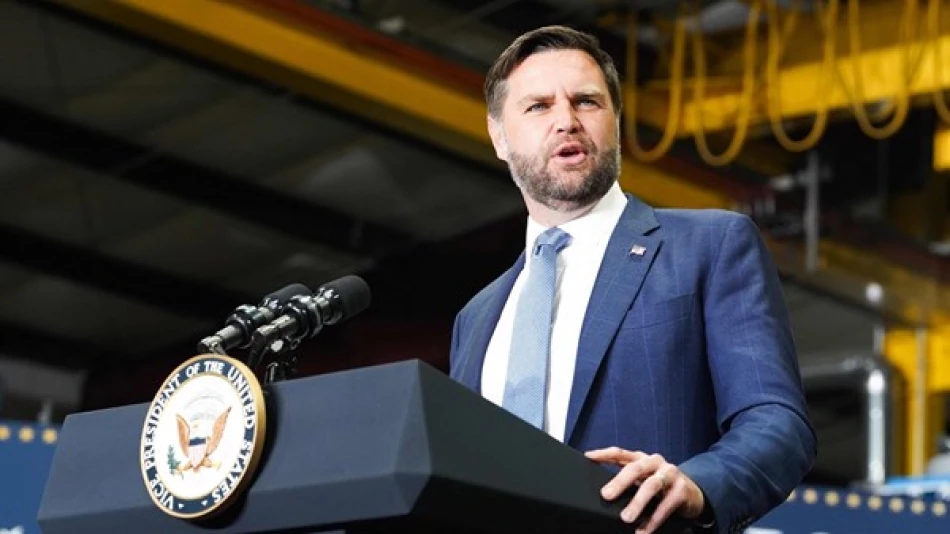
Russia Makes Significant Concessions on Ukraine Crisis, Says Vance
Russia Shows New Flexibility in Ukraine Peace Talks as Trump Diplomacy Takes Hold
US Vice President J.D. Vance declared Sunday that Russia has made "significant concessions" on Ukraine and demonstrated unprecedented flexibility toward reaching a settlement, following direct talks between President Donald Trump and Vladimir Putin. The comments signal a potential diplomatic breakthrough in a conflict that has raged for nearly three years, though concrete details remain scarce.
Moscow's Strategic Shift
Speaking to NBC, Vance emphasized that "the Russians have made significant concessions to President Trump for the first time in three and a half years of this conflict." He added that Moscow has shown "willingness to demonstrate flexibility regarding a number of their core demands."
This marks a notable departure from Russia's previously rigid negotiating stance. Since the invasion began in February 2022, Putin's government has consistently demanded Ukraine's complete capitulation, including recognition of annexed territories and permanent neutrality. Any softening of these positions would represent a major diplomatic development.
High-Stakes Diplomatic Chess
The timing of Vance's remarks carries particular significance. They came as US envoy Keith Kellogg visited Kyiv for Ukraine's Independence Day commemorations, meeting with President Volodymyr Zelensky and Canadian Prime Minister Mark Carney. This dual-track approach—engaging both Moscow and Kyiv simultaneously—reflects Trump's promised "peace through strength" strategy.
Trump met Putin in Alaska on August 15, followed by hosting Zelensky and European leaders in Washington days later. This shuttle diplomacy mirrors successful peace initiatives from previous decades, though the current conflict's complexity presents unique challenges.
Reality Check on Peace Prospects
Despite Vance's optimistic assessment, concrete progress remains elusive. Russian Foreign Minister Sergey Lavrov stated Saturday that no trilateral summit is currently planned, dampening expectations for immediate breakthroughs. The gap between diplomatic rhetoric and actual negotiations often proves wide in conflicts of this magnitude.
Historical precedent suggests that initial concessions frequently represent tactical positioning rather than genuine compromise. Russia's apparent flexibility may reflect battlefield realities—economic sanctions, military losses, and domestic pressure—rather than genuine desire for peace.
Strategic Implications for Global Markets
Any genuine peace movement would trigger significant market reactions across multiple sectors. Energy markets, heavily influenced by the conflict, could see dramatic shifts if Russian oil and gas return to global markets. Defense contractors, who have benefited from increased military spending, might face headwinds from reduced demand.
European markets particularly stand to benefit from conflict resolution. The continent has borne the heaviest economic burden through energy crises, refugee costs, and military aid commitments totaling hundreds of billions of dollars.
The Trump Factor
Vance's emphasis on active diplomacy with both sides reflects Trump's campaign promise to end the conflict within his first 100 days. While critics dismiss this as unrealistic, the administration's willingness to engage directly with Putin—unlike the previous administration's approach—could yield different results.
The key question remains whether Russia's apparent concessions address Ukraine's core concerns: territorial integrity and security guarantees. Any deal that fails to satisfy Kyiv's fundamental requirements would likely prove temporary, potentially setting the stage for future conflicts.
As Vance noted, the conflict "serves no one's interests"—a pragmatic assessment that may finally be driving all parties toward serious negotiations. Whether this translates into lasting peace will depend on both sides' willingness to make genuinely painful compromises.
Most Viewed News

 Layla Al Mansoori
Layla Al Mansoori






